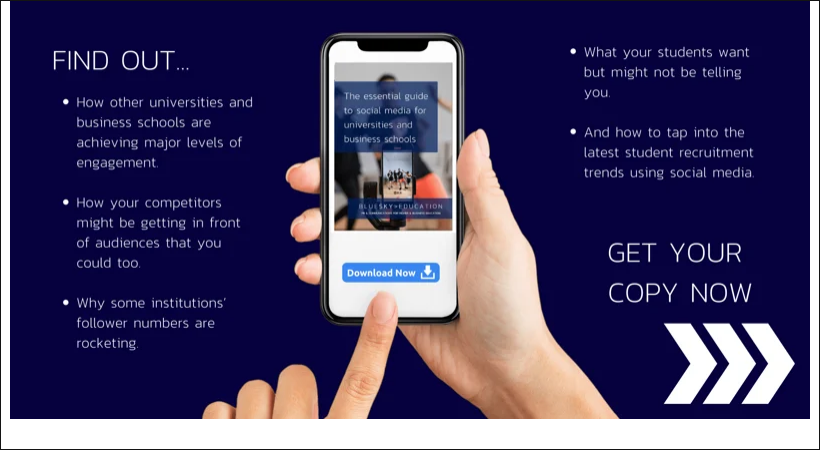Hashtags are a feature of social media that can be difficult to understand, use, and keep up with. But, once you get the hang of them, the results are clear to see.
If you are using social media to market your institution, then you should definitely be using hashtags. Hashtags can help boost your university or business school’s social media reach and engagement. An effective social media strategy should include a mix of popular, relevant, and branded hashtags – but don’t get too carried away, less can be more when it comes to hashtags!
Let’s break down the basics of successfully using hashtags on social media and why you should use them, I'll cover:
- How to find hashtags that will work best for your university
- Why using popular hashtags alone probably isn’t the right approach
- Essential tips for using hashtags on different social media platforms
What is a hashtag used for?
Using hashtags is a way to group together conversations or content around a certain topic, making it easy for people to find content that they’re looking for. Hashtags can be used on most social media platforms but I’d say they’re most popular on Twitter and Instagram, and some might even argue LinkedIn too.
Hashtag rules
- They always start with # but won’t work if you use spaces, punctuation, or symbols (it will probably only hashtag part of what you were hoping to).
- Think about the number of hashtags you use. More isn’t always better. It can make your post look like spam and some algorithms don’t like it.
- Make sure your accounts are public. Otherwise, the content you write won’t be seen by any non-followers – and that’s just a missed opportunity!
- Don’t string too many words together. The greatest hashtags tend to be short, snappy and easy to recollect.
- Use relevant and specific hashtags. If it is too obscure, it will be hard to find and it probably won’t be used by other social media users – what would be the point in using it?
Why do people use hashtags?
Hashtags are a way to search for information and connect with people with the same interests as you, and they can be used for just about any kind of post. For example, if you are a university that wants to highlight your specialism in technology, you could use hashtags to promote your research or work within the school to attract students as well as staff, or maybe just people interested in what you do that could lead to corporate partnerships and more. You could also use hashtags to raise awareness for a cause or to start a conversation about something your institution supports. Hashtags are also a great way to keep up with trends and breaking news. It’s good to get involved if you have something relevant and authentic to say (but be careful not to use them to force unrelated content into people’s feeds).
Here are a few more reasons you should be using hashtags in your social media strategy…
Increase engagement with your followers
Including hashtags in your posts means taking part in a wider conversation happening on that particular social media platform. This can lead to greater interaction, boosting your university or business school’s social media reach and engagement through likes, shares, comments, and new followers which is exactly what you want to do in order to influence your key audiences, e.g. attracting potential students interested in studying at your university.
Build awareness with branded hashtags
Creating a branded hashtag can be an effective way to promote your school and gather content from multiple accounts. They can be as simple as using your institution’s name or incorporating a tagline into a hashtag.
For example, Munich Business School have a hashtag that they consistently use - #MBS – see here:
Let’s take a look at some advice for specific platforms:
Instagram has advised users to stick to including three to five hashtags in captions. On this platform, longer captions aren’t always the most effective, they should usually support and add to the image or video, so try to make your post as engaging but as straight to the point as possible and consider leaving the sharing of more detailed information to platforms like LinkedIn.
LinkedIn is useful for longer form content so aiming for 1200-1600 characters per post is good practice. Including hashtags in this, LinkedIn is similar to other social media platforms, less is more! Use at least three but no more than 10 hashtags, otherwise you risk letting your post look like spam.
Using a hashtag can be a simple way to contextualise what you’re talking about, without using up valuable characters or writing repetitive Tweets.
Twitter recommends no more than two hashtags per tweet. Consider whether you can engage with trending hashtags.
We see a lot of highly active academics on Twitter – think about engaging with these communities and their conversations, it could be especially useful when it comes to recruiting – they may already know your institution and see what you do in a positive way!
Use hashtags to help your target audience find you
On LinkedIn and Instagram, users can follow hashtags as well as other users. Using a few popular hashtags can be another way to help users find your school. For example, if you use #HigherEducation, #UniLife or #MBA on your Instagram posts, someone who follows one of those hashtags will see your recent post in their feed. You might even gain some new followers this way. So, try to identify niche hashtags that are relevant to your institution.
How to find the best hashtags to use
To find hashtags that are specific to your university, your research, and your audience, do some research to see results, here’s what we suggest…
1. Find related hashtags
If you already know which hashtags are working well for your accounts now, consider using related hashtags. These are likely to be more specific than the popular hashtags you’re already using, which could help you connect with a more targeted audience. On LinkedIn, for example, you can find more hashtag recommendations, click on the “Discover more hashtags” button.
You could even take a look at what hashtags your competitors are using – but check they’re seeing good engagement on them!
2. Analyse which hashtags were successful from old posts
Keep track of which hashtags you’ve used on past posts. Analyse which have been most popular, then see if there’s a trend with the hashtags you’ve used. If you notice some of your most popular posts always contain a few of the same hashtags, make a point to include those in your future posts.
How to increase organic reach with hashtags
When you use hashtags, your post becomes discoverable to people who are searching for that hashtag. For example, if you’re a student based in London and use the hashtag #LondonUniversity, someone who is engaged and looking for a university in London may come across your post.
When we typed in the hashtag #LondonUniversity, we found plenty of engaging posts just like this:
Even we, here at BlueSky Education, use hashtags to search and engage with users that are interested in our industry!
The best way to increase your organic reach using hashtags is to use ones that are relevant to your institution and industry. Do some research on which hashtags are most popular, then start using them in your posts. Once you have a refined list of relevant, high-performing hashtags, you can start using them in your posts, and build from there!
With an eye for style and always keeping impact in mind, Megan is dedicated to delivering consistently interesting content that influences audiences, demonstrating growth in both engagement and follower numbers across different key platforms and networks. Beyond creating gripping content, Megan regularly produces key insights into how business schools and universities could, and should, be using social media as a marketing tool.


.png?width=160&height=200&name=team%20photos%20(13).png)



